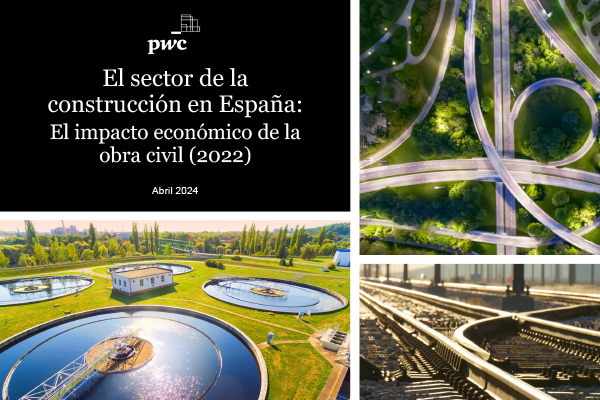Multiplier effect of civil works in Spain: every million euros invested generates 780,571 euros in GDP, 12 full-time jobs and 263,366 euros in tax returns
Multiplier effect of civil works in Spain: every million euros invested generates 780,571 euros in GDP, 12 full-time jobs and 263,366 euros in tax returns

For every million euros invested in civil works in Spain, 780,571 euros in GDP are generated directly, indirectly and induced, almost 12 full-time jobs (FTE) and 263,366 euros in fiscal return, according to data from the report "The construction sector in Spain. The economic impact of civil works (2022)", prepared by PwC at the request of SEOPAN, the Association of Construction Companies and Infrastructure Concessionaires. Similarly, taking into account this multiplier effect of investing in civil works in Spain, for every euro of direct GDP linked to civil works in Spain, 3 euros are generated in the economy as a whole, for every FTE job linked to civil works, almost 3 FTE jobs are created and for every euro directly raised by civil works, 2.3 euros of total tax revenue are generated.
The study also shows that, in terms of annual production, construction is the third economic engine of our country, contributing 180,179 M€ - 6.9% of the total national production - and made up of 422,000 companies (data from 2022).
Among other data, the study points out that the domestic supply of construction services satisfies practically all the demand for services in the country, with imports accounting for 0.2% of the sector's supply and that companies in the construction sector include building activities (54.2%), civil works (13.1%) and specialised construction (32.7%).
The report focuses on civil works, highlighting the contribution and boost of infrastructures to productivity and competitiveness, connectivity and the demographic challenge, public health and quality of life, and the energy and digital transition.
It also highlights the high socio-economic contribution of civil works, with manufacturing industry and commerce as the sectors that benefit most indirectly and induced, both in terms of GDP, accounting for 34.5% of the contribution of civil works, and in terms of employment, with 40.5% of indirect employment and employment induced by civil works.
The study explains that, as a result of the financial crisis that Spain suffered in 2008, the public budget allocated to civil works was drastically reduced and, despite the arrival of European recovery funds in 2021, the pre-crisis figures have not yet been recovered. This decrease in public investment -11,863 M€ in 2022 vs. 33,680 M€ in 2009- is causing the ageing of infrastructures and a decline in the stock of public capital such that, if the current rate of investment persists, by 2030, almost half of the public infrastructures in Spain will be over 20 years old. This investment deficit particularly affects water, port and road infrastructures, which are the oldest.
Lastly, the study points out that civil works are a fundamental pillar for meeting the Sustainable Development Goals (SDGs) defined by the United Nations, for which, according to SEOPAN estimates, €241 billion will be needed in planned infrastructures related to the integral water cycle, transport, energy and public facilities infrastructures. Taking into account the aforementioned impact multipliers, these necessary investments in the short and medium term would generate an impact of 188,063 M€ in GDP, 2,796,829 new full-time jobs and 62,688 M€ in tax revenue.








